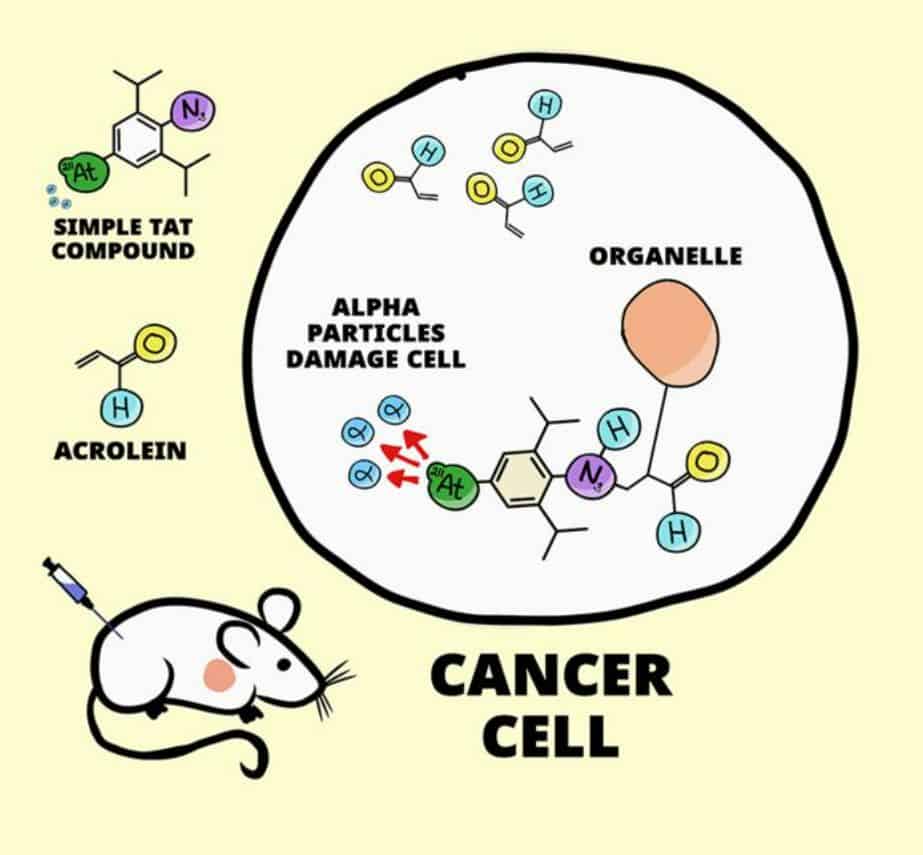Just one shot into Tumor: This new method from Japanese researchers can also be used “to treat very early-stage cancer even if we don’t know where the tumor is.”
A team of researchers, led by Katsunori Tanaka at the RIKEN Cluster for Pioneering Research (CPR) in Japan, along with Hiromitsu Haba at the RIKEN Nishina Center for Accelerator-Based Science (RNC), has developed an innovative technique with the potential to treat various types of cancer in a more comprehensive manner while minimizing negative side effects.
Their groundbreaking study, published today in Chemical Science, demonstrated the efficacy of a novel compound capable of emitting controlled amounts of alpha radiation from within cancer cells. By doing so, the compound effectively destroyed cancer cells while preserving healthy tissue, resulting in significantly reduced tumor growth and 100% survival rates in mice following a single injection.
Standard chemotherapy and radiation treatments often come with severe side effects, and achieving complete eradication of cancer cells is not always guaranteed, particularly in cases where cancer has metastasized throughout the body. Consequently, the primary focus of current research endeavors revolves around identifying methods to selectively target cancer cells, ensuring that treatments exclusively impact tumors. While certain targeted therapies exist, they are limited in their applicability to specific types of cancer.
“One of the greatest advantages of our new method,” remarks Tanaka, “is that is can be used to treat many kinds of cancer without any targeting vectors, such as antibodies or peptides.”

The novel technique relies on fundamental principles of chemistry and exploits the accumulation of a compound called acrolein within cancer cells. Several years ago, Tanaka’s team utilized a similar approach for detecting individual breast cancer cells. They employed a specific type of azide, an organic molecule featuring a group of three nitrogen atoms (N3) at its end, and attached a fluorescent compound to it. When the azide and acrolein encountered each other within a cancer cell, they underwent a reaction that caused the fluorescent compound to bind to internal structures within the cancer cell. This technique effectively illuminated cancer cells within the body since acrolein is predominantly absent in healthy cells.
In the recent study, the team took a step further by not only detecting cancer cells but also targeting them for destruction. Their rationale was straightforward. Instead of connecting the azide to a fluorescent compound, they attached it to a substance capable of selectively killing a cell without harming neighboring cells. They chose to work with astatine-211, a radionuclide that emits low levels of radiation in the form of alpha particles during its decay. While alpha particles are slightly more potent than other types of radiation, they have a limited range of about one twentieth of a millimeter and can be obstructed by a sheet of paper. Theoretically, when astatine-211 is anchored within a cancer cell, the emitted alpha particles should harm the cancerous cell but have minimal impact beyond that point.
Once the team determined the optimal method for attaching astatine-211 to the azide probe, they conducted a proof-of-concept experiment to validate their hypothesis. They implanted human lung tumor cells into mice and evaluated the treatment under three conditions: injecting astatine-211 directly into the tumor, injecting the astatine-211-azide probe into the tumor, and injecting the astatine-211-azide probe into the bloodstream. They observed that without targeted treatment, tumors continued to grow, and the mice did not survive. As anticipated, when the azide probe was utilized, tumor growth diminished by nearly threefold, and a significantly higher number of mice survived—achieving a 100% survival rate when injected into the tumor and 80% when injected into the bloodstream.
“We found that just one tumor injection with only 70 kBq of radioactivity was extremely effective at targeting and eliminating tumor cells,” adds Tanaka. “Even when injecting the treatment compound into the bloodstream, we were able to achieve similar results. This means we can use this method to treat very early-stage cancer even if we don’t know where the tumor is.”
Clinical trials are currently underway to evaluate the effectiveness of the fluorescent probe variant of this technique in visualizing and diagnosing cancer at the cellular level. With this milestone achieved, the next crucial phase involves seeking a collaborative partner to initiate clinical trials utilizing this innovative approach for the treatment of cancer in human patients.
Source:10.1039/d3sc02513f
Image Credit: Shutterstock
